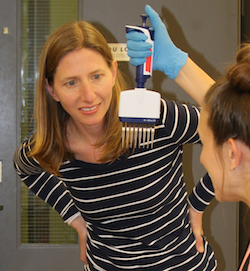News Information
- Published
- January 16, 2019
- Department/College
- University News
SEASIDE, Ca., January 16, 2019 – California State University, Monterey Bay (CSUMB) School of Natural Sciences associate professor and Fulbright Scholarship recipient Cheryl Logan departed for the Galápagos Islands this week to begin researching coral thermal tolerance in the region.
SEASIDE, Ca., January 16, 2019 – California State University, Monterey Bay (CSUMB) School of Natural Sciences associate professor and Fulbright Scholarship recipient Cheryl Logan departed for the Galápagos Islands this week to begin researching coral thermal tolerance in the region.

The goal of Logan’s five-month project, titled “Galápagos corals: canaries in the coal mine,” is to develop a better model for predicting future coral bleaching. According to Logan, the Galápagos corals are of particular interest as some populations may have acquired heat tolerance that could help them withstand future climate change.
The sobering reality is that coral reefs as we know them may be gone within my children’s lifetime. I am excited for this opportunity to apply my expertise to a critically important environmental issue that our nation and world are facing.”
“The 1982-83 El Niño event was the first time scientists recorded widespread coral bleaching around the world. In that event, about 90 percent of the corals in the Galápagos were killed from abnormally high sea surface temperatures that led to coral bleaching and mortality. Since then, however, some populations have recovered and were found to be more resilient to heat stress during subsequent El Niño events,” said Logan.

Logan will test both cold and warm water conditions as either can lead to coral bleaching. She’ll be measuring thermal tolerance windows and taking genetic samples to test if corals are better adapted to changing temperatures. Two of Logan’s CSUMB graduate students, Steve Ryan and Caroline Rodriguez, will also be joining her for part of the research.
Logan explained that identifying unique thermally resistant genotypes is critical for ongoing protection and preservation and that understanding the state of corals in the Galápagos will provide insights into how global reefs may function in the future.
“The sobering reality is that coral reefs as we know them may be gone within my children’s lifetime. I am excited for this opportunity to apply my expertise to a critically important environmental issue that our nation and world are facing,” said Logan.
The five-month expedition will be a family affair for Logan as her husband, a researcher with the Monterey Bay Aquarium, was also awarded a Fulbright of his own.
“My husband, Sal Jorgensen, is a shark ecologist with the Monterey Bay Aquarium and he was also awarded a Fulbright so will be taking our whole family -- we have a three-year-old and a five-year-old -- to the Galápagos.”
Logan’s project, “Galápagos corals: canaries in the coal mine,” is also being supported by a grant from the National Geographic Society.